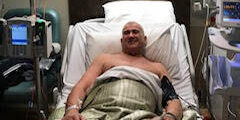Read time 4 minutes
Q-1) Could you briefly describe your story?
A-1) I was diagnosed with POEMS Syndrome in November 2021. The symptoms were evident and showed up for almost a year. It took almost 6 months for the diagnosis. Many tests followed and consultations to finally get the diagnosis.
POEMS syndrome is a rare blood disorder. It damages the nerves and affects other parts of the body. It involves having too many abnormal plasma cells. The cells can damage many body systems and organs. The full form of “POEMS” includes polyneuropathy, organomegaly, endocrinopathy, M-protein, and skin changes.
My doctor performed several tests to confirm the disorder:
-
Blood and urine tests: I was tested for both my blood and urine samples. It was to see if I had high levels of M-protein or VEGF.
The blood test was performed to see if I had an abnormal amount of blood cells. The abnormality is a sign of POEMS.
-
Bone marrow biopsy: It was done that revealed the abnormal-looking plasma cells. The numbers were quite high.
-
Imaging: CT scans were done. It was to see if my bones had hardened or thickened. The changes can occur if there is too much M-protein.
-
Electromyogram (EMG): This test measures nerve function. It helped my doctor diagnose polyneuropathy.
Q-2) How has the disease changed your life? Your diet, work, and other activities?
A-2) From early 2021 my strength, ability to walk distances, and fatigue all got more severe. By the time of diagnosis, I was barely able to walk very far and required a mobility walker. I was unable to stay balanced on my feet and was frequently tired. The diet seemed unaffected until radio and chemotherapies started. I worked from home for a period was my walking and ability to drive were affected. By April 2021 I had to give up work completely as fatigue was overwhelming.
Q-3) How do you keep yourself updated about your disease? Please specify if you are a member of an advocacy group. Depending on government initiatives; or reading about your disease.
A-3) Because POEMS is very rare, there is very limited information available.
The Oncology / Hematology specialists at my hospital had no prior experience with it. Hence why the diagnosis took so long. Luckily a Radiologist at the hospital had seen another case at a different hospital. The symptoms were very like mine, which led to my diagnosis.
I was lucky.
I have recently found a Facebook page. It has fellow sufferers from around the world. Here in Australia, it has been a source of comfort and valuable information.
Q-4) Are your treatment options easy to access? Are they expensive? Is there a permanent cure for your disease?
A-4) I am fortunate the basic medical system in Australia allows for free treatments. Although there may be delays and wait-for lists. Having said that, there are still costs associated with medications. I need to incur many costs including commuting for appointments and many more. It still feels costly, and the financial burden is huge when not working.
I have had a stem cell transplant. It does not cure completely. But it stops the production of Proteins that attack the nervous system.
The stem cell transplant puts you in remission. But others have reported recurrences of POEMS, so effectively it is never cured. Also, the nerve damage can be permanent, dependent on the extent f the damage.
Q-5) How did the treatment affect your family’s financial situation? Did you have to take loans or borrow money from friends and family?
A-5) Because I have had to stop work it has affected me. I am fortunate to have an insurance policy for such eventualities. It only started after 3 months without pay after work and will only last for most of 2 years. I am surviving on less than half of my work salary currently, which barely covers day-to-day bills.
Q-6) Are you trying out any alternate healing techniques?
A-6) None to speak of. Initially, I had not heard of any alternative techniques. Some of the other fellow patients I know have tried to date which has helped. I am still to try any of them.
Q-7) How did you and your family deal with your changed circumstances?
A-7) Family was fantastic in the support of me.
From helping with household chores that I could no longer do. Also, help me with hospital visits.
This process would have been very difficult without the help of family.
This is a topic that I could write about for hours. I already have tears in my eyes.
Family caregivers have played an integral role in supporting my care- management.
Medications can help control symptoms of many serious illnesses. However, they might take a while to become effective. Medication alone cannot often be enough to keep these diseases in check.
My family took full charge. That’s often especially true when the person is your child. But taking on complete responsibility is great.
Instead of driving me to every appointment or errand, they accompanied me. Also, helped me prepare every meal. We had a great time, sharing different stories and instances while cooking. They had open and honest conversations.
We worked together to set realistic expectations and then implemented them.
They recognized and praised my strengths and progress which gave me strength.
I am positive because of them. They have hope that one day things will be much better.
Q-8) Please share one aspect of your journey that touched you most.
A-8) As per (A-7), family, neighbors looking out for me, and general kindness of people.
Q-9) What would be your message or advice to patients diagnosed with rare diseases?
A-9) Ensure you are getting enough rest and proper medicines.
DISCLAIMER
The views expressed in this article are the author’s own and do not represent any kind of medical advice.


